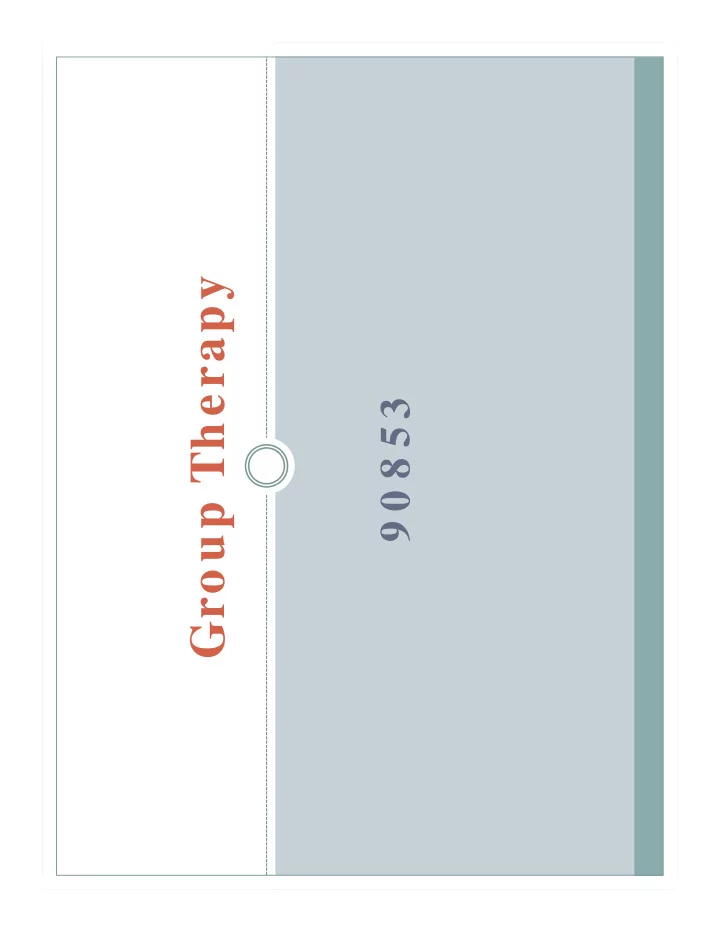

Group Therapy 9 0 8 5 3
The Changes Compliance with Correct Coding Standards 1. Per the National Correct Coding Initiative, the CPT code definition of group psychotherapy (90853) has a unit concept of “1 session”. Prior to the change, DVHA was using a unit concept of “per 15 minutes”. Vermont Medicaid was not complying with the correct unit definition. Effective 7/1/15, Medicaid allows 1 session/day for group psychotherapy codes. Align with resource based relative value system (RBRVS) payment methodology. 2. Medicaid State Plan requires that reimbursement of professional services follow RBRVS. RBRVS is used to set rates for professional services. It is the same underlying system used by Medicare. It set rates for nearly all medical services covered by Medicaid. Medicaid reimbursement for group therapy was based on a value 2Xs what would be calculated under RBRVS. To comply, Medicaid updated the rate in 2 steps to allow for a phased in approach: 1. Effective 7/1/15 the rate for 1 session = $41.00 2. Effective 1/1/2016 the rate was updated to current RBRVS methodology = $20.50
Why RBRVS? The RBRVS fee schedule uses cost data to determine how much resources are needed to do a particular service relative to all other services. RVUs are set based on a formula that uses data to derive relative valuation of each individual healthcare service. The formula uses utilization, physician effort, direct and indirect cost data to derive rates. The process is transparent and governed by federal proposed and final rule making. Medicaid’s conversion factor is based on the amount of legislatively allocated dollars available to reimburse for professional services. The time spent planning for a group session, arranging for services, providing reports and communicating with other health care professionals is considered part of the pre and post ‐ service work already built into the RBRVS methodology for psychotherapy codes. It is maintained by CMS for use in the Medicare program and is updated annually.
Why RBRVS? It is not preferable to pull a single service from the fee schedule for the following reasons: It requires a SPA and would require justification and supporting data on the need for deviation from the methods for rate setting. For example, quantifiable demonstration of an access to care issue. It requires procedures that deviate from standard operating procedures and are at high risk for errors in implementation or updates. It sets precedent for resolution of rate disputes to result in arbitrary rates not set based on recent cost and utilization data. The reason this rate change is necessary is due to this code being treated differently and resulting in mis ‐ valuation of the service over many years. Providers were previously allowed by DVHA to bill per 15 minutes instead of per session, as required. When rate updates were done, a manual entry was needed to convert a per session rate to a per 15 minute rate. This calculation was done in error and resulted in a per 30 minutes rate.
Ensuring Access DVHA plans to monitor for signals of an access to care issues as a result of this change before considering alternative payment for group therapy. DVHA reviews any member or provider complaints regarding access to care issues Review conducted by Reimbursement and Provider Member Relations Units Includes review of: • Utilization (how many members accessed services in the last 24 months) • Service areas • Network and provider capacity • Reimbursement for services Regular communication between DVHA and provider, particularly providers considering leaving network
Verm ont Com pared to Other States * In previous budget requests, DVHA has requested additional funding for all professional services • to help alleviate the disparity between its rates and Medicare and commercial rates. Any additional funding to professional services would increase the group therapy rate • proportionately to other services. *State rate comparison reflects base rates.
Recommend
More recommend